04 Nov

Know What Is Pytest?
Pytest is a well-used Python testing framework that allows you to write simple and scalable test cases on your code in an easy manner. It is a popular developer and QA engineer’s tool used to conduct unit testing, functional testing, and even large end-to-end tests when Python is used.
How to Install Pytest?
You can install pytest using pip, which is Python’s package manager. Just run the following command in your terminal or command prompt:

Once installed, you can verify it by running:

This confirms that the installation was successful and tells you which version is installed.
Write our Basic Test
A basic test in pytest is simple and doesn’t require any special classes or syntax. Here’s an example:

To run this test, execute:

pytest will automatically detect files starting with test_ and run all test functions inside them.
Multiple Tests at a Time
You can write and organize multiple test cases in one file or across multiple files. Here’s an example with multiple tests in the same file:

Running pytest will automatically pick all these test functions and execute them one after the other, providing a report of pass/fail results.
What is Python’s Testing Framework?
Testing frameworks for Python are aids used to make an otherwise cumbersome task of creating and executing tests on Python code even easier. Examples of well-known frameworks are:
- unittest – a Python add-on that is like JUnit in Java.
- nose2, which was a successor of the previous nose framework.
- doctest – executes tests inside your documentation.
- pytest is most used nowadays due to its complexity, simplicity, and readability.
One of the reasons pytest is special is that it is easy to learn and use, but it does not compromise advanced testing requirements.
Benefits of Pytest
The following are some of the major features of pytest usage:
- Simple to write: Basic assert statements as opposed to complex assertions.
- Clear failure messages: Displays a precise error message.
- Auto discovery: Discovers the tests without having to specify them.
- Strong setups: Setup/teardown logic that can be used repeatedly via @pytest.fixture.
- Scalable: lots of plugins (pytest-django, pytest-cov, pytest-xdist, etc.)
- Allows parameterization: Execute the same test with numerous data sets.
Conclusion
Pytest represents an effective and adaptive testing tool for Python. Give a turn to a small script or a large application, and pytest ensures the process is efficient and readable. It is an excellent tool not only for novices but also an experienced developers who have to make sure about the quality and stability of his/her code.
Contact QACraft today to discuss your project and get a customized Testing Services plan. Mail us at inquiry@qacraft.com or call us at +91 91577 86796 to get started!

Diksham